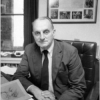Louis Auchincloss

Louis Auchincloss
Louis Stanton Auchincloss was an American lawyer, novelist, historian, and essayist. He is best known as a prolific novelist who parlayed his experiences into books exploring the experiences and psychology of American polite society and old money. His dry, ironic works of fiction continue the tradition of Henry James and Edith Wharton...
NationalityAmerican
ProfessionNovelist
Date of Birth27 September 1917
CityLawrence, NY
CountryUnited States of America